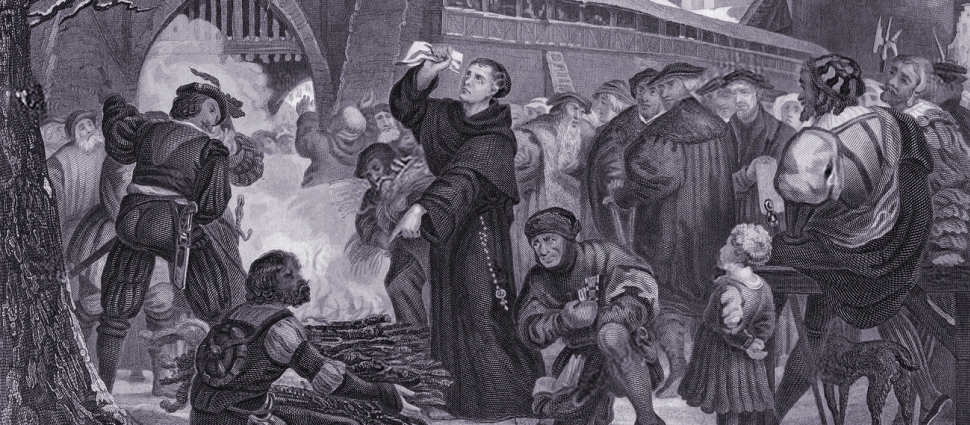Friday, May 1, 2020

Luke 7:36-50
One of the Pharisees asked him to eat with him, and he went into the Pharisee's house and reclined at table. And behold, a woman of the city, who was a sinner, when she learned that he was reclining at table in the Pharisee's house, brought an alabaster flask of ointment, and standing behind him at his feet, weeping, she began to wet his feet with her tears and wiped them with the hair of her head and kissed his feet and anointed them with the ointment. Now when the Pharisee who had invited him saw this, he said to himself, “If this man were a prophet, he would have known who and what sort of woman this is who is touching him, for she is a sinner.” And Jesus answering said to him, “Simon, I have something to say to you.” And he answered, “Say it, Teacher.”
“A certain moneylender had two debtors. One owed five hundred denarii, and the other fifty. When they could not pay, he cancelled the debt of both. Now which of them will love him more?” Simon answered, “The one, I suppose, for whom he cancelled the larger debt.” And he said to him, “You have judged rightly.” Then turning toward the woman he said to Simon, “Do you see this woman? I entered your house; you gave me no water for my feet, but she has wet my feet with her tears and wiped them with her hair. You gave me no kiss, but from the time I came in she has not ceased to kiss my feet. You did not anoint my head with oil, but she has anointed my feet with ointment. Therefore I tell you, her sins, which are many, are forgiven—for she loved much. But he who is forgiven little, loves little.” And he said to her, “Your sins are forgiven.” Then those who were at table with him began to say among themselves, “Who is this, who even forgives sins?” And he said to the woman, “Your faith has saved you; go in peace.”
The parable in this passage is quite short and used to illustrate the connection between forgiveness and gratitude:
“A certain moneylender had two debtors. One owed five hundred denarii, and the other fifty. When they could not pay, he cancelled the debt of both. Now which of them will love him more?”
It is a simple parable. Two men were in debt to a moneylender. One owed the sum of fifty denarii, the other owed five hundred. When it became clear that neither debtor could pay, the moneylender chose to forgive the debt of both men. Jesus then asked the Pharisee a question the answer to which seemed obvious: “Which of them will love him more?”
In this parable Jesus made what would have been for the Pharisee a most unwelcome implication. Because of what this woman once was, because of the great debt of sin from which she was released, her love for God would have likely been greater than that of the Pharisee.
It was clear that the Pharisee was not able to see what this woman had become. But her love for Jesus told the story. Nevertheless, all the Pharisee could see was what the woman once was. To make the point even clearer Jesus pronounced the woman forgiven. It is important to understand that the woman was not forgiven because she loved Jesus. Rather, in keeping with the parable he just told, the woman loved Jesus because he forgave her. Her debt had been paid.
Well before the Apostle Paul so powerfully articulated justification by faith Jesus declared to the woman: “Your faith has saved you.” This is how God has always saved his people. From Adam and Eve who believed the promise of Genesis 3:15 to Abraham who believed the covenant promise of God to this sinful woman who believed and was saved.
Luke’s account concludes with the onlookers astonished by Jesus’ authority to forgive sins. They began to wonder aloud, “Who is this that even forgives sins?” That, of course, is the question that must be pressed upon us all. It is the question upon which eternity hangs. Who will forgive us of our sins?
Every single person is weighted down with a moral debt that they cannot possibly pay. There is not a person alive who, whether they are conscious of it or not, is not trying desperately to do something about their sin; some way to find forgiveness.
Either they are trying to numb themselves into believing their sin has no consequences or they are hoping that in the end their good deeds will outweigh their bad deeds. Either they are libertines who seek salvation in indulgence or they are self-righteous moralists who are banking on the notion that they’ve been good enough. But they are both in debt up to their eyeballs.
And whether you tend more toward Simon the Pharisee or are more like the sinful woman your only hope is the One who forgives sins.
My sins, my sins, my Saviour!
They take such hold on me,
I am not able to look up,
Save only, Christ, to Thee;
In Thee is all forgiveness,
In Thee abundant grace,
My shadow and my sunshine
The brightness of Thy face.
My sins, my sins, my Saviour!
How sad on Thee they fall;
Seen through Thy gentle patience,
I tenfold feel them all;
I know they are forgiven,
But still, their pain to me
Is all the grief and anguish
They laid, my Lord, on Thee.
Therefore my songs, my Saviour,
E'en in this time of woe,
Shall tell of all Thy goodness
To suffering man below;
Thy goodness and Thy favour,
Whose presence from above,
Rejoice those hearts, my Saviour,
That live in Thee and love.
* John S. B. Monsell (1811-1875)




